- Home
- Truman Capote
Breakfast at Tiffany's Page 5
Breakfast at Tiffany's Read online
Page 5
Passing a Woolworth’s, she gripped my arm: “Let’s steal something,” she said, pulling me into the store, where at once there seemed a pressure of eyes, as though we were already under suspicion. “Come on. Don’t be chicken.” She scouted a counter piled with paper pumpkins and Halloween masks. The saleslady was occupied with a group of nuns who were trying on masks. Holly picked up a mask and slipped it over her face; she chose another and put it on mine; then she took my hand and we walked away. It was as simple as that. Outside, we ran a few blocks, I think to make it more dramatic; but also because, as I’d discovered, successful theft exhilarates. I wondered if she’d often stolen. “I used to,” she said. “I mean I had to. If I wanted anything. But I still do it every now and then, sort of to keep my hand in.”
We wore the masks all the way home.
I HAVE A MEMORY OF spending many hither and yonning days with Holly; and it’s true, we did at odd moments see a great deal of each other; but on the whole, the memory is false. Because toward the end of the month I found a job: what is there to add? The less the better, except to say it was necessary and lasted from nine to five. Which made our hours, Holly’s and mine, extremely different.
Unless it was Thursday, her Sing Sing day, or unless she’d gone horseback riding in the park, as she did occasionally, Holly was hardly up when I came home. Sometimes, stopping there, I shared her wake-up coffee while she dressed for the evening. She was forever on her way out, not always with Rusty Trawler, but usually, and usually, too, they were joined by Mag Wildwood and the handsome Brazilian, whose name was José Ybarra-Jaegar: his mother was German. As a quartet, they struck an unmusical note, primarily the fault of Ybarra-Jaegar, who seemed as out of place in their company as a violin in a jazz band. He was intelligent, he was presentable, he appeared to have a serious link with his work, which was obscurely governmental, vaguely important, and took him to Washington several days a week. How, then, could he survive night after night in La Rue, El Morocco, listening to the Wildwood ch-ch-chatter and staring into Rusty’s raw baby-buttocks face? Perhaps, like most of us in a foreign country, he was incapable of placing people, selecting a frame for their picture, as he would at home; therefore all Americans had to be judged in a pretty equal light, and on this basis his companions appeared to be tolerable examples of local color and national character. That would explain much; Holly’s determination explains the rest.
Late one afternoon, while waiting for a Fifth Avenue bus, I noticed a taxi stop across the street to let out a girl who ran up the steps of the Forty-second Street public library. She was through the doors before I recognized her, which was pardonable, for Holly and libraries were not an easy association to make. I let curiosity guide me between the lions, debating on the way whether I should admit following her or pretend coincidence. In the end I did neither, but concealed myself some tables away from her in the general reading room, where she sat behind her dark glasses and a fortress of literature she’d gathered at the desk. She sped from one book to the next, intermittently lingering on a page, always with a frown, as if it were printed upside down. She had a pencil poised above paper—nothing seemed to catch her fancy, still now and then, as though for the hell of it, she made laborious scribblings. Watching her, I remembered a girl I’d known in school, a grind, Mildred Grossman. Mildred: with her moist hair and greasy spectacles, her stained fingers that dissected frogs and carried coffee to picket lines, her flat eyes that only turned toward the stars to estimate their chemical tonnage. Earth and air could not be more opposite than Mildred and Holly, yet in my head they acquired a Siamese twinship, and the thread of thought that had sewn them together ran like this: the average personality reshapes frequently, every few years even our bodies undergo a complete overhaul—desirable or not, it is a natural thing that we should change. All right, here were two people who never would. That is what Mildred Grossman had in common with Holly Golightly. They would never change because they’d been given their character too soon; which, like sudden riches, leads to a lack of proportion: the one had splurged herself into a top-heavy realist, the other a lopsided romantic. I imagined them in a restaurant of the future, Mildred still studying the menu for its nutritional values, Holly still gluttonous for everything on it. It would never be different. They would walk through life and out of it with the same determined step that took small notice of those cliffs at the left. Such profound observations made me forget where I was; I came to, startled to find myself in the gloom of the library, and surprised all over again to see Holly there. It was after seven, she was freshening her lipstick and perking up her appearance from what she deemed correct for a library to what, by adding a bit of scarf, some earrings, she considered suitable for the Colony. When she’d left, I wandered over to the table where her books remained; they were what I had wanted to see. South by Thunderbird. Byways of Brazil. The Political Mind of Latin America. And so forth.
On Christmas Eve she and Mag gave a party. Holly asked me to come early and help trim the tree, I’m still not sure how they maneuvered that tree into the apartment. The top branches were crushed against the ceiling, the lower ones spread wall-to-wall; altogether it was not unlike the yuletide giant we see in Rockefeller Plaza. Moreover, it would have taken a Rockefeller to decorate it, for it soaked up baubles and tinsel like melting snow. Holly suggested she run out to Woolworth’s and steal some balloons; she did: and they turned the tree into a fairly good show. We made a toast to our work, and Holly said: “Look in the bedroom. There’s a present for you.”
I had one for her, too: a small package in my pocket that felt even smaller when I saw, square on the bed and wrapped with a red ribbon, the beautiful bird cage.
“But, Holly! It’s dreadful!”
“I couldn’t agree more; but I thought you wanted it.”
“The money! Three hundred and fifty dollars!”
She shrugged. “A few extra trips to the powder room. Promise me, though. Promise you’ll never put a living thing in it.”
I started to kiss her, but she held out her hand. “Gimme,” she said, tapping the bulge in my pocket.
“I’m afraid it isn’t much,” and it wasn’t: a St. Christopher’s medal. But at least it came from Tiffany’s.
HOLLY WAS NOT A GIRL who could keep anything, and surely by now she has lost that medal, left it in a suitcase or some hotel drawer. But the bird cage is still mine. I’ve lugged it to New Orleans, Nantucket, all over Europe, Morocco, the West Indies. Yet I seldom remember that it was Holly who gave it to me, because at one point I chose to forget: we had a big falling-out, and among the objects rotating in the eye of our hurricane were the bird cage and O.J. Berman and my story, a copy of which I’d given Holly when it appeared in the university review.
Sometime in February, Holly had gone on a winter trip with Rusty, Mag and José Ybarra-Jaegar. Our altercation happened soon after she returned. She was brown as iodine, her hair was sun-bleached to a ghost-color, she’d had a wonderful time: “Well, first of all we were in Key West, and Rusty got mad at some sailors, or vice versa, anyway he’ll have to wear a spine brace the rest of his life. Dearest Mag ended up in the hospital, too. First-degree sunburn. Disgusting: all blisters and citronella. We couldn’t stand the smell of her. So José and I left them in the hospital and went to Havana. He says wait till I see Rio; but as far as I’m concerned Havana can take my money right now. We had an irresistible guide, most of him Negro and the rest of him Chinese, and while I don’t go much for one or the other, the combination was fairly riveting: so I let him play kneesie under the table, because frankly I didn’t find him at all banal; but then one night he took us to a blue movie, and what do you suppose? There he was on the screen. Of course when we got back to Key West, Mag was positive I’d spent the whole time sleeping with José. So was Rusty: but he doesn’t care about that, he simply wants to hear the details. Actually, things were pretty tense until I had a heart-to-heart with Mag.”
We were in the front room, where, though i
t was now nearly March, the enormous Christmas tree, turned brown and scentless, its balloons shriveled as an old cow’s dugs, still occupied most of the space. A recognizable piece of furniture had been added to the room: an army cot; and Holly, trying to preserve her tropic look, was sprawled on it under a sun lamp.
“And you convinced her?”
“That I hadn’t slept with José? God, yes. I simply told—but you know: made it sound like an agonized confession—simply told her I was a dyke.”
“She couldn’t have believed that.”
“The hell she didn’t. Why do you think she went out and bought this army cot? Leave it to me: I’m always top banana in the shock department. Be a darling, darling, rub some oil on my back.” While I was performing this service, she said: “O.J. Berman’s in town, and listen, I gave him your story in the magazine. He was quite impressed. He thinks maybe you’re worth helping. But he says you’re on the wrong track. Negroes and children: who cares?”
“Not Mr. Berman, I gather.”
“Well, I agree with him. I read that story twice. Brats and niggers. Trembling leaves. Description. It doesn’t mean anything.”
My hand, smoothing oil on her skin, seemed to have a temper of its own: it yearned to raise itself and come down on her buttocks. “Give me an example,” I said quietly. “Of something that means something. In your opinion.”
“Wuthering Heights,” she said, without hesitation.
The urge in my hand was growing beyond control. “But that’s unreasonable. You’re talking about a work of genius.”
“It was, wasn’t it? My wild sweet Cathy. God, I cried buckets. I saw it ten times.”
I said, “Oh” with recognizable relief, “oh” with a shameful, rising inflection, “the movie.”
Her muscles hardened, the touch of her was like stone warmed by the sun. “Everybody has to feel superior to somebody,” she said. “But it’s customary to present a little proof before you take the privilege.”
“I don’t compare myself to you. Or Berman. Therefore I can’t feel superior. We want different things.”
“Don’t you want to make money?”
“I haven’t planned that far.”
“That’s how your stories sound. As though you’d written them without knowing the end. Well, I’ll tell you: you’d better make money. You have an expensive imagination. Not many people are going to buy you bird cages.”
“Sorry.”
“You will be if you hit me. You wanted to a minute ago: I could feel it in your hand; and you want to now.”
I did, terribly; my hand, my heart was shaking as I recapped the bottle of oil. “Oh no, I wouldn’t regret that. I’m only sorry you wasted your money on me: Rusty Trawler is too hard a way of earning it.”
She sat up on the army cot, her face, her naked breasts coldly blue in the sun-lamp light. “It should take you about four seconds to walk from here to the door. I’ll give you two.”
I WENT STRAIGHT UPSTAIRS, GOT the bird cage, took it down and left it in front of her door. That settled that. Or so I imagined until the next morning when, as I was leaving for work, I saw the cage perched on a sidewalk ashcan waiting for the garbage collector. Rather sheepishly, I rescued it and carried it back to my room, a capitulation that did not lessen my resolve to put Holly Golightly absolutely out of my life. She was, I decided, “a crude exhibitionist,” “a time waster,” “an utter fake”: someone never to be spoken to again.
And I didn’t. Not for a long while. We passed each other on the stairs with lowered eyes. If she walked into Joe Bell’s, I walked out. At one point, Madame Sapphia Spanella, the coloratura and roller-skating enthusiast who lived on the first floor, circulated a petition among the brownstone’s other tenants asking them to join her in having Miss Golightly evicted: she was, said Madame Spanella, “morally objectionable” and the “perpetrator of all-night gatherings that endanger the safety and sanity of her neighbors.” Though I refused to sign, secretly I felt Madame Spanella had cause to complain. But her petition failed, and as April approached May, the open-windowed, warm spring nights were lurid with the party sounds, the loud-playing phonograph and martini laughter that emanated from Apt. 2.
It was no novelty to encounter suspicious specimens among Holly’s callers, quite the contrary; but one day late that spring, while passing through the brownstone’s vestibule, I noticed a very provocative man examining her mailbox. A person in his early fifties with a hard, weathered face, gray forlorn eyes. He wore an old sweat-stained gray hat, and his cheap summer suit, a pale blue, hung too loosely on his lanky frame; his shoes were brown and brand-new. He seemed to have no intention of ringing Holly’s bell. Slowly, as though he were reading Braille, he kept rubbing a finger across the embossed lettering of her name.
That evening, on my way to supper, I saw the man again. He was standing across the street, leaning against a tree and staring up at Holly’s windows. Sinister speculations rushed through my head. Was he a detective? Or some underworld agent connected with her Sing Sing friend, Sally Tomato? The situation revived my tenderer feelings for Holly; it was only fair to interrupt our feud long enough to warn her that she was being watched. As I walked to the corner, heading east toward the Hamburg Heaven at Seventy-ninth and Madison, I could feel the man’s attention focused on me. Presently, without turning my head, I knew that he was following me. Because I could hear him whistling. Not any ordinary tune, but the plaintive, prairie melody Holly sometimes played on her guitar: Don’t wanna sleep, don’t wanna die, just wanna go a-travelin’ through the pastures of the sky. The whistling continued across Park Avenue and up Madison. Once, while waiting for a traffic light to change, I watched him out of the corner of my eye as he stooped to pet a sleazy Pomeranian. “That’s a fine animal you got there,” he told the owner in a hoarse, countrified drawl.
Hamburg Heaven was empty. Nevertheless, he took a seat right beside me at the long counter. He smelled of tobacco and sweat. He ordered a cup of coffee, but when it came he didn’t touch it. Instead, he chewed on a toothpick and studied me in the wall mirror facing us.
“Excuse me,” I said, speaking to him via the mirror, “but what do you want?”
The question didn’t embarrass him; he seemed relieved to have had it asked. “Son,” he said, “I need a friend.”
He brought out a wallet. It was as worn as his leathery hands, almost falling to pieces; and so was the brittle, cracked, blurred snapshot he handed me. There were seven people in the picture, all grouped together on the sagging porch of a stark wooden house, and all children, except for the man himself, who had his arm around the waist of a plump blond little girl with a hand shading her eyes against the sun.
“That’s me,” he said, pointing at himself. “That’s her …” he tapped the plump girl. “And this one over here,” he added, indicating a tow-headed beanpole, “that’s her brother, Fred.”
I looked at “her” again: and yes, now I could see it, an embryonic resemblance to Holly in the squinting, fat-cheeked child. At the same moment, I realized who the man must be.
“You’re Holly’s father.”
He blinked, he frowned. “Her name’s not Holly. She was a Lulamae Barnes. Was,” he said, shifting the toothpick in his mouth, “till she married me. I’m her husband. Doc Golightly. I’m a horse doctor, animal man. Do some farming, too. Near Tulip, Texas. Son, why are you laughin’?”
It wasn’t real laughter: it was nerves. I took a swallow of water and choked; he pounded me on the back. “This here’s no humorous matter, son. I’m a tired man. I’ve been five years lookin’ for my woman. Soon as I got that letter from Fred, saying where she was, I bought myself a ticket on the Greyhound. Lulamae belongs home with her husband and her churren.”
“Children?”
“Them’s her churren,” he said, almost shouted. He meant the four other young faces in the picture, two barefooted girls and a pair of overalled boys. Well, of course: the man was deranged. “But Holly can’t be the mother
of those children. They’re older than she is. Bigger.”
“Now, son,” he said in a reasoning voice, “I didn’t claim they was her natural-born churren. Their own precious mother, precious woman, Jesus rest her soul, she passed away July 4th, Independence Day, 1936. The year of the drought. When I married Lulamae, that was in December, 1938, she was going on fourteen. Maybe an ordinary person, being only fourteen, wouldn’t know their right mind. But you take Lulamae, she was an exceptional woman. She knew good-and-well what she was doing when she promised to be my wife and the mother of my churren. She plain broke our hearts when she ran off like she done.” He sipped his cold coffee, and glanced at me with a searching earnestness. “Now, son, do you doubt me? Do you believe what I’m saying is so?”
I did. It was too implausible not to be fact; moreover, it dovetailed with O.J. Berman’s description of the Holly he’d first encountered in California: “You don’t know whether she’s a hillbilly or an Okie or what.” Berman couldn’t be blamed for not guessing that she was a child-wife from Tulip, Texas.
“Plain broke our hearts when she ran off like she done,” the horse doctor repeated. “She had no cause. All the housework was done by her daughters. Lulamae could just take it easy: fuss in front of mirrors and wash her hair. Our own cows, our own garden, chickens, pigs: son, that woman got positively fat. While her brother growed into a giant. Which is a sight different from how they come to us. ’Twas Nellie, my oldest girl, ’twas Nellie brought ’em into the house. She come to me one morning, and said: ‘Papa, I got two wild yunguns locked in the kitchen. I caught ’em outside stealing milk and turkey eggs.’ That was Lulamae and Fred. Well, you never saw a more pitiful something. Ribs sticking out everywhere, legs so puny they can’t hardly stand, teeth wobbling so bad they can’t chew mush. Story was: their mother died of the TB, and their papa done the same—and all the churren, a whole raft of ’em, they been sent off to live with different mean people. Now Lulamae and her brother, them two been living with some mean, no-count people a hundred miles east of Tulip. She had good cause to run off from that house. She didn’t have none to leave mine. ’Twas her home.” He leaned his elbows on the counter and, pressing his closed eyes with his fingertips, sighed. “She plumped out to be a real pretty woman. Lively, too. Talky as a jaybird. With something smart to say on every subject: better than the radio. First thing you know, I’m out picking flowers. I tamed her a crow and taught it to say her name. I showed her how to play the guitar. Just to look at her made the tears spring to my eyes. The night I proposed, I cried like a baby. She said: ‘What you want to cry for, Doc? ’Course we’ll be married. I’ve never been married before.’ Well, I had to laugh, hug and squeeze her: never been married before!” He chuckled, chewed on his toothpick a moment. “Don’t tell me that woman wasn’t happy!” he said, challengingly. “We all doted on her. She didn’t have to lift a finger, ‘cept to eat a piece of pie. ’Cept to comb her hair and send away for all the magazines. We must’ve had a hunnerd dollars’ worth of magazines come into that house. Ask me, that’s what done it. Looking at show-off pictures. Reading dreams. That’s what started her walking down the road. Every day she’d walk a little further: a mile, and come home. Two miles, and come home. One day she just kept on.” He put his hands over his eyes again; his breathing made a ragged noise. “The crow I give her went wild and flew away. All summer you could hear him. In the yard. In the garden. In the woods. All summer that damned bird was calling: Lulamae, Lulamae.”

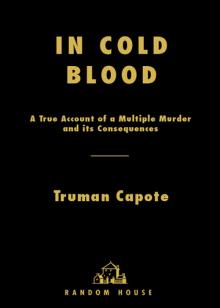 In Cold Blood
In Cold Blood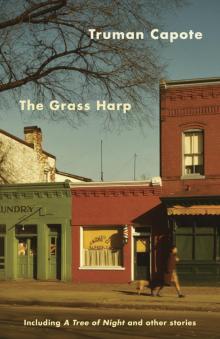 The Grass Harp, Including a Tree of Night and Other Stories
The Grass Harp, Including a Tree of Night and Other Stories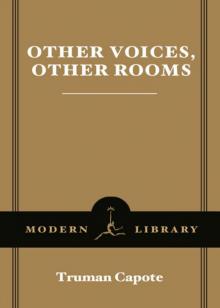 Other Voices, Other Rooms
Other Voices, Other Rooms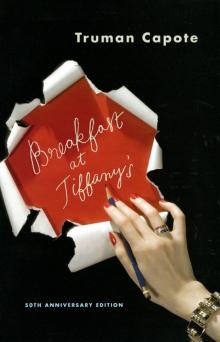 Breakfast at Tiffany's
Breakfast at Tiffany's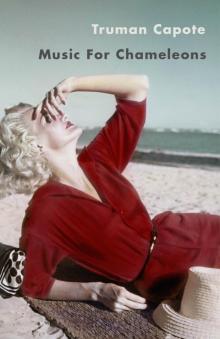 Music For Chameleons
Music For Chameleons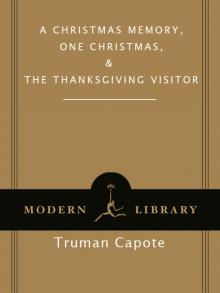 A Christmas Memory, Including One Christmas and the Thanksgiving Visitor
A Christmas Memory, Including One Christmas and the Thanksgiving Visitor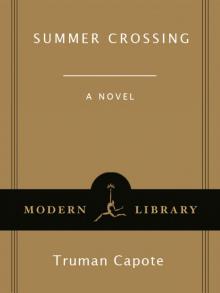 Summer Crossing
Summer Crossing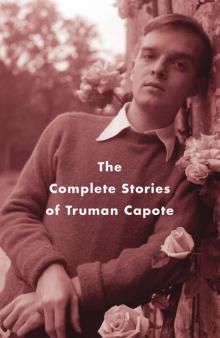 The Complete Stories of Truman Capote
The Complete Stories of Truman Capote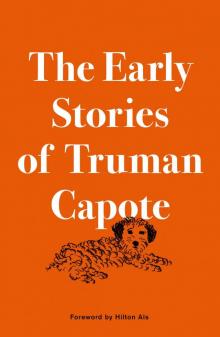 The Early Stories of Truman Capote
The Early Stories of Truman Capote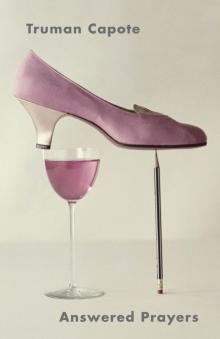 Answered Prayers
Answered Prayers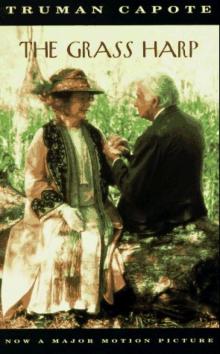 The Grass Harp
The Grass Harp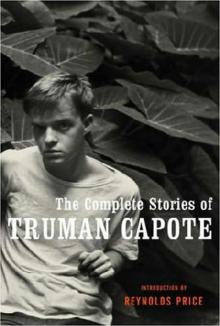 SSC (2004) The Complete Stories of Truman Capote
SSC (2004) The Complete Stories of Truman Capote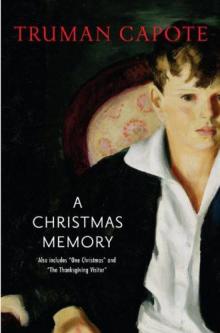 A Christmas Memory
A Christmas Memory